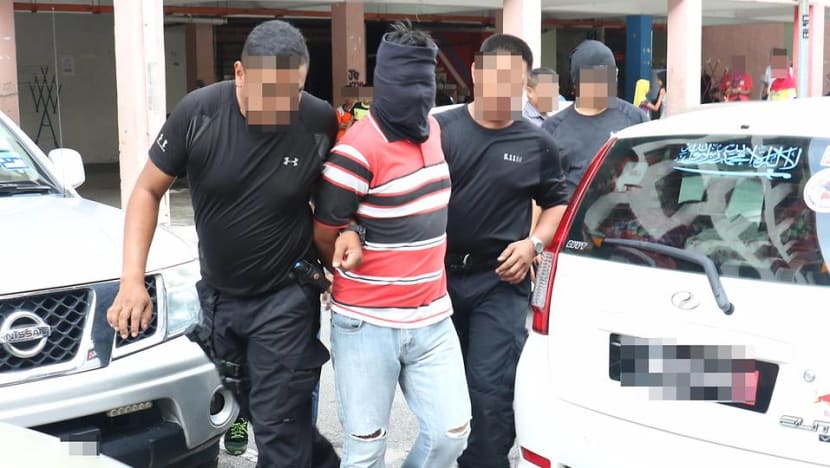Malaysian Al Qaeda scientist who tried to produce WMD to be released from jail next year

A terror suspect arrested in Johor in March 2018. A counterterrorism expert has warned that terror groups might look for Yazid Sufaat after his release. (Photo: Royal Malaysia Police)
KUALA LUMPUR: A Malaysian scientist who once led Al Qaeda’s quest to produce weapons of mass destruction (WMD) in Afghanistan will be released from prison next year, according to Malaysian police, who warn that he remains a security risk.
Yazid Sufaat, 54, an Al Qaeda operative who helped set up a laboratory in Kandahar, Afghanistan where he tried to cultivate anthrax, has been jailed three times by Malaysian authorities for terror-related offences in the past 16 years.
“He (Yazid) will be released in the middle of next year,” Ayob Khan Mydin Pitchay, head of Malaysian police's Special Branch counterterrorism division, told the International Association for Counterterrorism and Security Professionals (IACSP) on Monday (Aug 27).
The Special Branch is the intelligence arm of the Royal Malaysian Police and the leading agency in counter-terrorism operations in the country.
Yazid, a former army captain, was detained for eight years under the Internal Security Act (ISA) between 2002 and 2010. The ISA was replaced by the Security Offences (Special Measures) Act (SOSMA) in 2012.
After Yazid's release, he started recruiting new members for Islamic State in Syria. In 2013, he was re-arrested again under SOSMA and was imprisoned for four years in a Tapah prison in Perak state.
Then in 2017, he was re-arrested and detained for two years, after it was found that he had been recruiting fellow inmates for Al Qaeda during his incarceration in Perak.
A SECURITY RISK AFTER PRISON?
Malaysia's counterterrorism chief Ayob believes Yazid remains a security risk.
“The fact that he indulged in terrorism-related activities after his release from the ISA and embarked on a recruitment drive among prisoners at the Tapah prison clearly show that he is unrepentant,” Ayob told Channel NewsAsia on Wednesday (Aug 29).
But counterterrorism expert Ahmad El-Muhammady, who interviewed Yazid in prison in November 2016, believes he would not take up arms again.
“I sense exhaustion, loneliness in him (Yazid) due to the long (prison) sentence. He just wants to return home,” Ahmad, a lecturer from International Islamic University Malaysia, told Channel News Asia.
“I don’t deny his radical ideas remain to a certain extent. Behaviour-wise, I believe he would abandon terrorism.”
But asked whether terror groups will look for Yazid after his release given his skills as a bio-chemistry scientist, he said “they might”.
“The question is, does he want to sacrifice his freedom after such a long absence from his beloved family? From what I observe he will not,” said Ahmad.
Yazid is married with three daughters.
While in prison, Yazid commanded the respect of his fellow inmates as a senior Al Qaeda operative, making it easy for him to recruit members for the terror group in the Tapah prison, Ahmad said.
“Inmates respected him due to his stature in Al Qaeda, experience, seniority and knowledge. None of the other detainees matched the breadth of his experience,” said Ahmad.
YAZID CAME CLOSE TO PRODUCING BIOLOGICAL WEAPONS: EXPERT
Yazid, a former army captain, is a graduate of biological science and chemistry from California State University, US.
According to Professor Zachary Abuza of the National War College in Washington DC, Yazid came close to producing mass biological weapons together with Hambali, Al Qaeda’s Southeast Asia leader.
“At the time of 9/11, he (Yazid) and Hambali, Al Qaeda's chief of operations in Southeast Asia, were in Kandahar, where they were hoping to take a virulent strain of anthrax into possession,” said Prof Abuza who specialises in terrorism and insurgencies in Southeast Asia.
“They had all the facilities and know-how to mass produce the biological weapon. What they did not have was the Ames stain of anthrax, the most lethal strain that is used in anthrax weapons.”
Yazid also bought 21 tonnes of ammonium nitrate to be used in terror attacks in Singapore.
“At the time of his arrest, he had already dispatched four tonnes of ammonium nitrate,” said Prof Abuza, adding that the rest of the material was eventually found.














